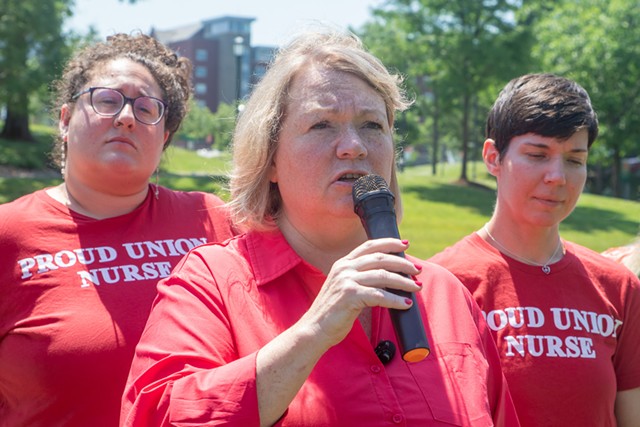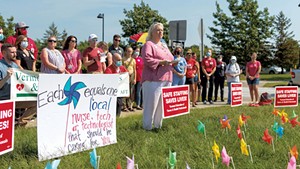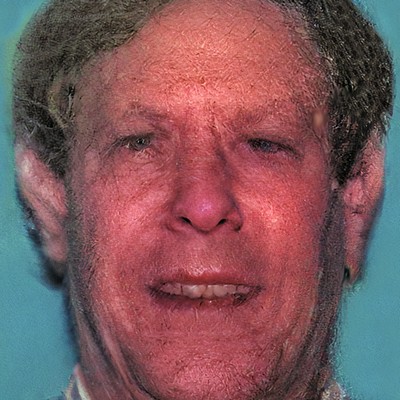
- Colin Flanders ©️ Seven Days
- Deb Snell speaking at Tuesday's press conference
The strike authorization vote by members of the Vermont Federation of Nurses & Health Professionals was endorsed by 85 percent of those who participated, the union said at a press conference on Tuesday.
The vote gives the union the power to call for a strike once its contract expires July 9, but it does not guarantee a walkout will happen. A federal mediator will attend negotiations this week, and the two sides have hinted that they’re open to compromise.
“We know what we need to keep nurses here in Vermont ... and we need the hospital to truly listen to us," union president Deb Snell said. "We know they can do better."
The hospital is working to “enhance and fine-tune” its offer, president Stephen Leffler told reporters at a separate press conference on Tuesday afternoon. “We do have the same goal in mind, and we are committed to paying the best possible wages that we can, within all the constraints that we have."
Several months of negotiations on a new three-year contract have brought the two sides nowhere close on proposed wage increases.
The hospital has offered a combined increase of 17 percent, which executives say would push wages above national averages and enable the medical center to compete with similar-size hospitals in the region.
The union, meanwhile, has proposed an increase of 46 percent. It’s also calling for new steps to be built into the contract so that experienced nurses can continue to earn annual pay bumps. About 500 nurses will have reached the top of the pay scale this fall, the union says, including some who started as new grads and are now in their forties, staring down another decade or two on the job.
Many nurses still struggle to get by in Chittenden County despite raises in recent years, Snell said. She pointed to a new report from trade magazine Becker's Hospital Review that found the average nurse pay in Vermont, when adjusted for the cost of living, is about $37 per hour — close to the bottom nationally.
When nurses leave for better-paying gigs out of state, staffing shortages worsen and the hospital winds up spending big on temporary workers, Snell said. A $10,000 sign-on bonus has aided recruitment efforts, but some still end up leaving after their yearlong commitment. They take on travel contracts themselves, Snell said, or “move to a state where they can make a living and start a family.”
The threat of a strike puts Vermont’s largest hospital in a bind as the summer budget season approaches. State regulators have urged the hospital to fix its access problems while at the same time pleading with it to trim costs.
But nurse pay represents 8 percent of the hospital's overall budget, and so the union's proposal would force it to either cut services or raise commercial insurance rates, Leffler told reporters. He estimated those rate hikes could be as high as 10 percent annually over the next three years, on top of whatever else might be needed to keep the ship running.
The hospital president appealed directly to nurses last week in an attempt to prevent what could be UVM's second strike in the past decade. He urged union members to vote against a work stoppage, calling the two-day strike in 2018 a “very difficult time for our organization, our staff and our patients."
It was also costly: The hospital paid $3 million to temporary workers during those two days. “These were resources that could have been spent at the bargaining table and, after the strike, UVMMC’s proposal did not change significantly,” Leffler wrote.
Leffler told reporters that the hospital is prepared to keep its doors open should nurses walk out again. "We're very confident we can provide high quality, safe care over the five days, but I truly hope that we do not have that situation," he said.
Whether striking nurses would receive the same level of support this time around remains to be seen: The same cost-of-living increases cited by the union have also battered the broader public over the past six years, and many say they struggle to afford their health care premiums.
"Our message to them is, unfortunately, in this economy, that is what it takes to bring nurses to Vermont," Snell said of the union's proposal.
While she hoped the threat of a strike would prove moot, Snell said she believes the union is in a better position now than it was in 2018, which is why a longer work stoppage is on the table.
“We don't believe that that two-day strike really made as much of an impact,” Snell said. “We are stronger this time. We are more committed. We know our value. We know our worth, and we know that they need us.”
“I'm going to be retiring in a few years,” Snell continued. “I want to know that there's someone to take my job, and take care of the patients, after I'm gone.”










Comments
Comments are closed.
From 2014-2020, Seven Days allowed readers to comment on all stories posted on our website. While we've appreciated the suggestions and insights, right now Seven Days is prioritizing our core mission — producing high-quality, responsible local journalism — over moderating online debates between readers.
To criticize, correct or praise our reporting, please send us a letter to the editor or send us a tip. We’ll check it out and report the results.
Online comments may return when we have better tech tools for managing them. Thanks for reading.